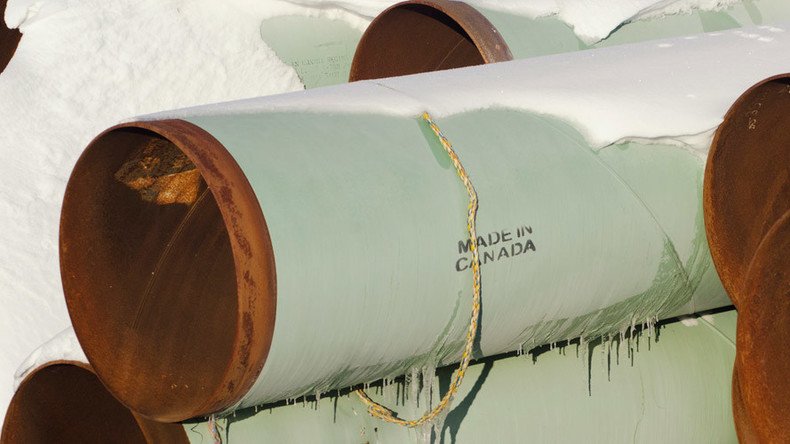TransCanada shutdowns Keystone I pipeline over possible spill in South Dakota

TransCanada Corporation has shut down a portion of the Keystone pipeline running through South Dakota, due to a leak, with no sign of a re-opening for several days. Meanwhile, protesters complain that the company was lax in informing the public.
TransCanada announced on Monday that it was investigating a possible spill near Freeman, South Dakota. Keystone customers were notified that the pipeline will remain shut while the investigation is underway.
We are currently investigating a potential incident on our #Keystone pipeline in #SouthDakota.
— TransCanada (@TransCanada) April 4, 2016
Crews initially found visible signs of oil in a small area. The leak is the pipeline’s fifth in South Dakota.
TransCanada spokesman Mark Cooper said a local landowner noticed signs of an oil spill around noon local time on Saturday and informed the company.
“As soon as we got that report in, we immediately began efforts to shut down the pipeline, and crews were immediately dispatched to the site,” Cooper told Canada’s The Globe and Mail, noting that the pipeline, which carries about 500,000 barrels of oil per day, was shut down in minutes.
TransCanada shuts down #Keystone pipeline following oil spill in South Dakota https://t.co/jeoDuMWDjy#dangerous
— hussein kudrati (@hsk5221) April 4, 2016
The company said crews had found “visible signs of oil” on the ground four miles from the company’s Freeman pump station on Saturday, according to the Associated Press. The company has begun pulling back topsoil to look for the source of the leak, but that work only started on Sunday.
Keystone pipeline has been shut down. Emergency crews found visible signs of oil on small surface area. pic.twitter.com/cYXYV9Tbdk
— TransCanada (@TransCanada) April 4, 2016
TransCanada said no significant damage to the environment had been observed, according to Argus Leader.
“They will be expected to remove any soil that’s been contaminated and any groundwater that’s contaminated,” Brian Walsh of the South Dakota Department of Environment and Natural Resources (DENR) told the Argus Leader.
DENR is responsible for monitoring the cleanup and ensuring that the company follows state laws and procedures during the process.
The leak is the fifth in the state for Keystone I, which was approved by the Public Utilities Commission in 2008. DENR’s spill map shows three releases of petroleum in 2010 and one in 2011, one of which took place at the same pump station in 2010, when less than five gallons were released due to a fitting leak, according to the Argus Leader.
Dakota Rural Action, a grassroots organization that opposed the Keystone XL project permits, was critical of the two-day delay in notifying the public.
“It’s more than a little concerning that the spill happened two days ago and the public is only now finding out, and that there’s a good possibility that the pipeline itself is the issue,” said Sue Sibson, a member of the group, whose land Keystone I crosses, according to the Angus Leader.
Hilarious-or just sad-their Keystone I pipeline spilled in SD the DAY they tweeted this #nokxl#ActOnClimatehttps://t.co/66Wi7BGebE
— Dakota Rural Action (@DakotaRural) April 4, 2016
The possible leak comes as TransCanada is trying to gain approval for its proposed Energy East Pipeline, which would ship Alberta crude to New Brunswick, a distance of over 2,800 miles.
People are still being misled about Keystone pipeline – @janekleeb [VIDEO] https://t.co/AXBdeamGoo@AshleeBanks_RTpic.twitter.com/PXG5aeMJr2
— RT America (@RT_America) January 8, 2016
The company’s expansion plans suffered a major setback when President Barack Obama rejected its proposed Keystone XL pipeline last November. Environmental groups had opposed the Hardisty, Alberta to Nebraska pipeline, arguing it would have facilitated increased exports of oil sands crude, while creating a potential for spills.
LIVE: #Obama makes #Keystone XL announcement https://t.co/wnQOF5e6yMpic.twitter.com/5v3lxGZ6Nd
— RT America (@RT_America) November 6, 2015
TransCanada’s Keystone I pipeline carries light and heavy crude from Hardisty, Alberta to refineries in Illinois and Oklahoma, while passing through the eastern Dakotas, Nebraska, Kansas and Missouri.
Its output represents about 15 percent of Western Canada’s crude export capacity, National Bank Financial Analyst Patrick Kenny told the Wall Street Journal.












